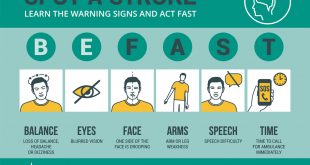Jesse T. McCann, M.D., Ph.D.
May marks Stroke Awareness Month, a crucial time to highlight the importance of understanding strokes and their potential impact on various aspects of health, including vision. While strokes primarily affect the brain, their repercussions can extend to the eyes, often serving as early indicators or resulting in lasting visual impairments. As we delve into the connection between strokes and vision, it becomes evident that raising awareness about this correlation is essential for early detection, prevention, and holistic stroke management.
Strokes, often referred to as “brain attacks,” occur when blood flow to the brain is interrupted or reduced, leading to the deprivation of oxygen and essential nutrients. This interruption can result from a blockage in the blood vessels (ischemic stroke) or the rupture of blood vessels (hemorrhagic stroke). While strokes can manifest in various ways, including sudden numbness or weakness in the face, arm, or leg, difficulty speaking, and severe headaches, their impact on vision is less commonly understood.
The eyes serve as windows to the brain, and changes in vision can often indicate underlying neurological issues, including strokes. One of the most common visual symptoms associated with strokes is sudden vision loss or changes, which can range from partial blindness to double vision. These changes may occur abruptly and affect one or both eyes, depending on the location and severity of the stroke. Additionally, individuals may experience visual disturbances such as blurred vision, tunnel vision, or difficulty focusing, all of which warrant immediate medical attention.
The connection between strokes and vision lies in the intricate network of blood vessels that supply oxygen and nutrients to the eyes and the brain. When a stroke occurs, these blood vessels may become compromised, leading to decreased blood flow and potential damage to the optic nerve or retina. The optic nerve, responsible for transmitting visual information from the eyes to the brain, is particularly vulnerable to the effects of strokes, often resulting in vision loss or impairment.
Furthermore, strokes can indirectly impact vision through their effects on cognitive function and mobility. Cognitive impairments resulting from strokes, such as memory loss or difficulty processing information, can hinder a person’s ability to interpret visual stimuli effectively. Similarly, mobility issues stemming from stroke-related paralysis or weakness can limit a person’s field of vision and spatial awareness, increasing the risk of falls or accidents.
Early detection and intervention are crucial in mitigating the visual consequences of strokes. Regular eye exams, including assessments of visual acuity, peripheral vision, and eye movement, can help detect subtle changes indicative of underlying neurological issues. Additionally, imaging tests such as magnetic resonance imaging (MRI) or computed tomography (CT) scans can provide valuable insights into the extent and location of brain damage caused by strokes.
Preventive measures play a pivotal role in reducing the risk of strokes and preserving vision. Lifestyle modifications, including maintaining a healthy diet, engaging in regular exercise, managing stress, and avoiding smoking and excessive alcohol consumption, can significantly lower the risk of stroke occurrence. Moreover, managing underlying health conditions such as hypertension, diabetes, and high cholesterol through medication and regular monitoring can further decrease the likelihood of stroke-related complications.
In conclusion, Stroke Awareness Month serves as a poignant reminder of the multifaceted nature of strokes and their potential impact on vision. By understanding the connection between strokes and the eyes, individuals can take proactive steps to safeguard their visual health and reduce the risk of stroke-related visual impairments. Through increased awareness, early detection, and comprehensive stroke management, we can strive towards a future where strokes no longer cast a shadow on vision and overall well-being.
Jesse T. McCann, M.D., Ph.D.
Originally from New York, Dr. McCann trained as a materials chemist with an undergraduate degree in chemistry from Dartmouth College followed by a Ph.D. from the University of Washington
in materials chemistry. In graduate school, he worked on designing advanced nanoscale materials used in the aerospace and biomedical fields. He completed his medical degree (Alpha Omega Alpha) from the Albert Einstein College of Medicine in the Bronx and residency training in ophthalmology at New York University. His interest in ophthalmology was cemented after volunteering to help prevent night blindness caused by Vitamin A insufficiency in the Thar Desert region of India.
Dr McCann is currently an active member of the American Academy of Ophthalmology, the European Society of Retina Specialists, and the Alpha Omega Alpha Honor Medical Society.
Since becoming a retina specialist, Dr. McCann has volunteered internationally to expand eye care and diabetic retinopathy care in Bolivia with Retina Global.
In his free time, Dr McCann enjoys kayaking, swimming, rescuing parrots, and spending time outdoors in the Florida sunshine.
Education: Dartmouth College, University of Washington, Albert Einstein College of Medicine (Alpha Omega Alpha), Greenwich-Yale New Haven Health, New York University, Manhattan Eye, Ear, and Throat Hospitals, Columbia University
Retina Group of Florida
If you are experiencing any changes in your eye health, whether it is blurry vision, pain, impaired vision, or any other visual irregularities, you should see an ophthalmologist right away. The earlier a disease is detected, the better the outcome and treatment options are for you. You will find a friendly and warm environment at Retina Group of Florida.
Please call (941) 743-3937 today to schedule your eye exam. When necessary same day appointments can often be accommodated.
Retina Group of Florida
Jesse T. McCann, M.D., Ph.D.
3280 Tamiami Trail, Suite 41
Port Charlotte, FL 33948
941-743-3937
www.retinagroupflorida.com
 Southwest Florida's Health and Wellness Magazine Health and Wellness Articles
Southwest Florida's Health and Wellness Magazine Health and Wellness Articles

